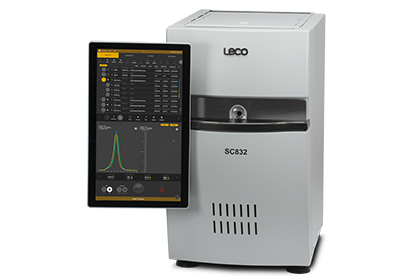LECO Solutions for Agriculture and Environment
LECO’s advanced analytical instruments provide crucial benefits to both the Agriculture and Environmental industries, offering powerful tools for monitoring, analysis, and research that drive sustainable practices and regulatory compliance.
Key Features of LECO’s Instruments:
- High Sensitivity and Accuracy: Detect trace-level compounds and elements crucial for both agricultural productivity and environmental monitoring.
- Versatility: Analyze a wide range of sample types, from soils and plant materials to water and air samples.
- Speed and Efficiency: Rapid analysis times enable high-throughput screening for both research and regulatory compliance needs.
- Robust Design: Withstand demanding field and laboratory conditions in both agricultural and environmental settings.
- User-Friendly Software: Intuitive interfaces and powerful data analysis tools suitable for both routine testing and complex research projects.
- Regulatory Compliance: Meet stringent regulatory standards for both agricultural product safety and environmental protection.
- Comprehensive Support: Access to LECO’s team of agriculture and environmental specialists for ongoing application support and training.
By leveraging LECO’s advanced analytical solutions, professionals in both the Agriculture and Environmental industries can make data-driven decisions that promote sustainable practices, ensure regulatory compliance, and support the delicate balance between agricultural productivity and environmental stewardship.
Complaints received by drinking water industries are often related to bad taste and/or unpleasant odors in drinking water. Most complaints involve the presence of chlorine or earthy/musty-smelling compounds. These issues can lead consumers to perceive the water as "unsafe", even though the substances causing the issues are typically not harmful. Reliable detection, identification, and quantification of the analytes behind these unpleasant tastes and odors in drinking water is essential for addressing these problems effectively. The Pegasus BTX GC-TOFMS system offers a solution to this challenge with the acquisition of full mass spectra even at concentrations below 50 pg/L, thanks to its exceptional sensitivity.
Designed for Agriculture and Environment







Application Notes
Learn more with our latest Agriculture and Environment application notes.
-
Analysis of Musty Odorous Compounds in Drinking Water by SPME GC-TOFMS
Complaints received by drinking water industries are often related to bad taste and/or unpleasant odors in drinking water. Most complaints involve the presence of chlorine or earthy/musty-smelling compounds. These issues can lead consumers to perceive the water as "unsafe", even though the substances causing the issues are typically not harmful. Reliable detection, identification, and quantification of the analytes behind these unpleasant tastes and odors in drinking water is essential for addressing these problems effectively. The Pegasus BTX GC-TOFMS system offers a solution to this challenge with the acquisition of full mass spectra even at concentrations below 50 pg/L, thanks to its exceptional sensitivity.
- Analysis of Phytosanitary Products in Surface Water and Groundwater Using GCxGC-TOFMS
-
Analysis of Polychlorinated Biphenyls (PCBs) in Fish Oil Supplements by Gas Chromatography with High-Performance Time-of-Flight Mass Spectrometry
The American Heart Association recommends eating two servings of fish per week, specifically fish with high fat content such as tuna and salmon. In this study, the advantages of using the Pegasus GC-HRT to analyze complex matrices such as fish oil are highlighted.
- Carbon and Nitrogen in Coal, Coke, Carbon Black, and Graphite
- Carbon and Sulfur in Metal Bearing Ores using CS844
Videos
Watch our most recent videos on Agriculture and Environment.
-
Environmental Non-Targeted Screening: What is in our Air? High-Resolution and Comprehensive Mass Spectrometry Analysis of Ambient Particulate Matter
Joining us from Imperial College London, Dr. Joseph Levermore present his research on 'What is in Our Air? High-Resolution and Comprehensive Mass Spectrometry Analysis of Ambient Particulate Matter in Occupational Environments Across the United Kingdom.' Dr. Levermore explores the composition of ambient particulate matter and its implications for occupational health, utilizing advanced mass spectrometry techniques to uncover the sources and characteristics of airborne particles in various work environments. He also highlights the critical importance of understanding air quality for worker safety and public health, providing valuable insights into the air we breathe.
Part of the 2024 Non-Target Screen Webinar Series -
What’s in the Water? Uncovering Unknown Disinfection By-Products using GCxGC and HRMS
Professor Susan Richardson from the University of South Carolina will delve into her groundbreaking research on a newly discovered class of disinfection byproducts in drinking water. Using advanced techniques such as gas chromatography coupled with high-resolution mass spectrometry, Professor Richardson sheds light on the implications for water safety and public health. Discover the benefits of mass spectrometry for environmental analysis and gain insight into the future of drinking water quality assessment.
Part of the 2024 Non-Target Screen Webinar Series -
Discovery Workflow Best Practices for Environmental Contaminants
When you don't know what you're looking for, as is often the case with environmental contaminants and pollutants, the task can seem daunting, but high-resolution TOFMS and GCxGC is a powerful combination for non-target searches. With the tools included with the Pegasus® HRT4D and the Multi-Mode Source™ (MMS™), identification of unknowns can be vastly improved and assigned higher confidence.
